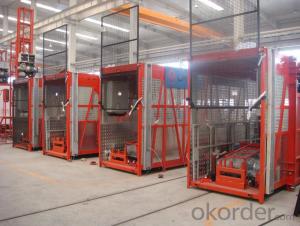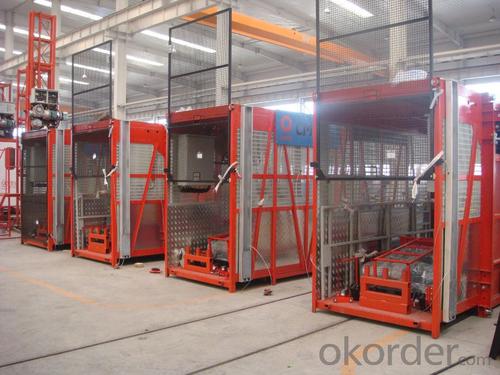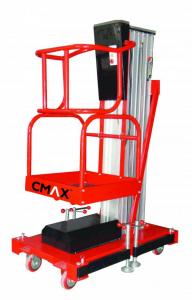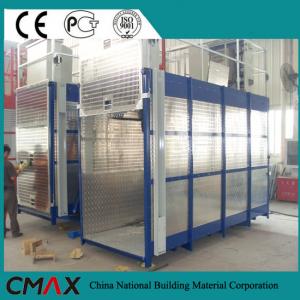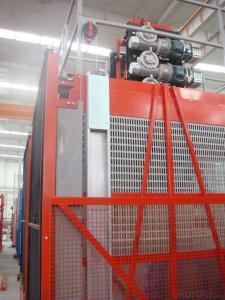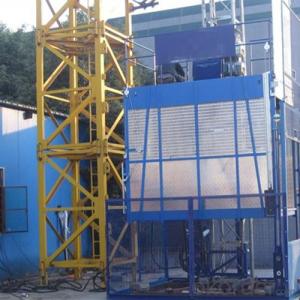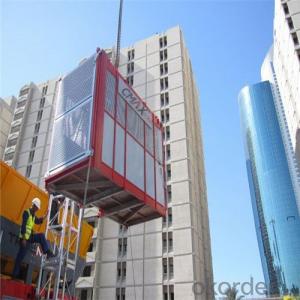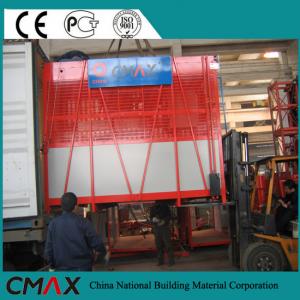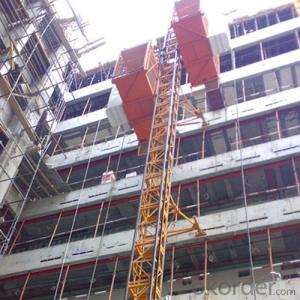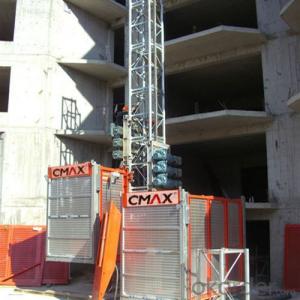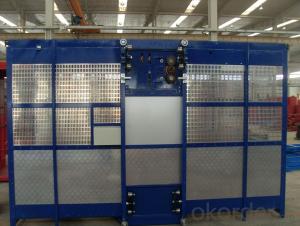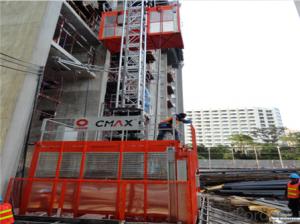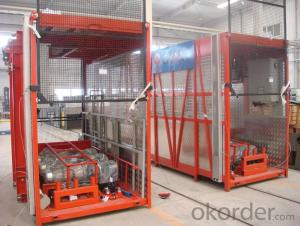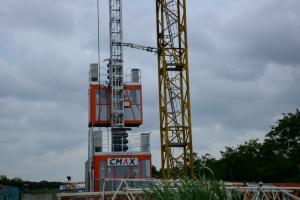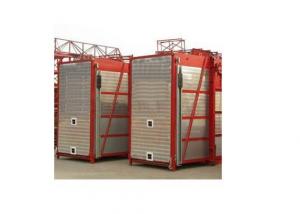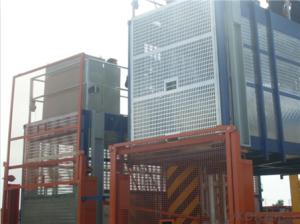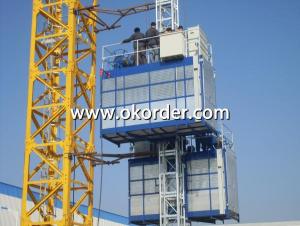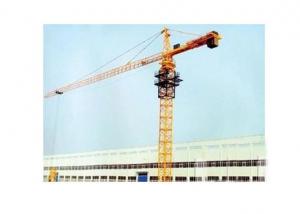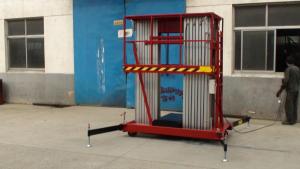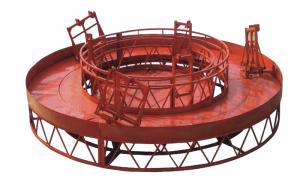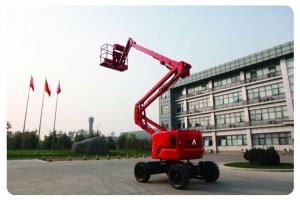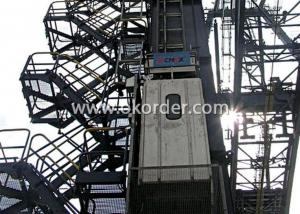CMAX SCD200 Construction Hoist
- Loading Port:
- Dalian
- Payment Terms:
- TT or LC
- Min Order Qty:
- 1 unit
- Supply Capability:
- 20 unit/month
OKorder Service Pledge
OKorder Financial Service
You Might Also Like
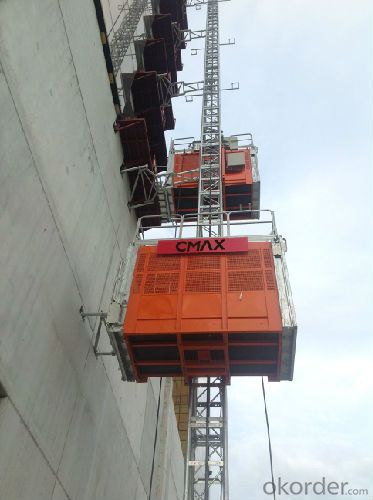
The construction hoist product produced by CNBM has achieved internationally advanced level in terms of industrial design, control and the drive performance, as well as the operation safety and comfortableness. And CNBM is also making efforts to keep improving the product, as what the construction hoist lifts is not only people and material, but also a kind of social responsibility and service concep.
The new generation SC series of construction hoists adopt modular structure, ergonomic design and advanced manufacturing technology, thus the adaptability and reliability of the product is greatly improved, e.g. the max. lifting height can reach 300 meters. The product adopts multiple patented technologies, reaches advanced level in China, and the market share in domestic market is increasing year by year. The product has also been exported to overseas countries like Russia, Turkmenstan, Vietnam, etc. winning the confidence of customers of both home and abroad.
1. The cage drive system is equipped with buffering device, so the cage moves more stable.
2. The ergonomically designed cage interior improves comfortableness.
3. The unique structural design has applied for patent.
4. The typical technologies ensure the malposition difference of the guide rail.
5. The excellent parts in the industry ensures reliable quality of the machine.
6. Precise assembly and accurate drive.
7. Professional solutions for special projects.
8. The complete safety devices ensures reliable control system.
Construction Hoists
SC series product also has special design, such as reinforced guide rail with cross-section of 800mm, inclined type, special for cooling tower, etc. All the double cage construction elevator can be changed into single cage type, such as SCD200.
Model | SC200/200 | SC200/200BP | SCD200/200 | SC200/200B | ||
Configuration | Standard type | Frequency conversion | Counterweight type | Export type | ||
Rated load | kg | 2000/2000 | 2000/2000 | 2000/2000 | 2000/2000 | |
Cage size L×W×H | m | 3×1.3×2.2 | 3×1.3×2.2 | 3×1.3×2.2 | 3×1.3×2.2 | |
Passengers | 16/16 | 16/16 | 16/16 | 16/16 | ||
Max.lifting height | m | 150 | 300 | 150 | 150 | |
Max.height of free end | m | 9 | 9 | 9 | 9 | |
Lifting speed | m/min | 33 | 0~60 | 33 | 33 | |
Capacity of small hoist | kg | 200 | 200 | 200 | 200 | |
Std.section L×W×H | mm | 650×650×1508 | ||||
Electric motor | Type | Disc brake electic motor | ||||
Power | kW | 11×3/11×3 | 11×3/11×3 | 11×2/11×2 | 11×3/11×3 | |
Speed limiter | Action speed | m/s | 1.2 | 1.45 | 1.2 | 1.2 |
Rated brake load | kN | 40 | 40 | 30 | 40 | |
Model | SCD200/200B | SC100/100 | SCD200 | ||
Configuration | Counterweight type | No counterweight | Counterweight type | ||
Rated load | kg | 2000/2000 | 1000/1000 | 2000 | |
Cage size L×W×H | m | 3×1.3×2.2 | 3×1.3×2.2 | 3×1.3×2.2 | |
Passengers | 16/16 | 12/12 | 16 | ||
Max.lifting height | m | 150 | 150 | 150 | |
Max.height of free end | m | 9 | 9 | 9 | |
Lifting speed | m/min | 33 | 33 | 33 | |
Capacity of small hoist | kg | 200 | 200 | 200 | |
Std.section L×W×H | mm | 650×650×1508 | |||
Electric motor | Type | Disc brake electic motor | |||
Power | kW | 11×2/11×2 | 11×2/11×2 | 11×2 | |
Speed limiter | Action speed | m/s | 1.2 | 1.2 | 1.2 |
Rated brake load | kN | 30 | 30 | 30 | |
The above parameters are subject to change without prior notice, please refer to the actual product.
Note: Both cage size of 3×1.3×2.2 and 3.2×1.5×2.4 are available for of each model (Excl. export type).
- Q: Is it possible to use a building hoist to lift multiple items simultaneously?
- <p>Yes, a building hoist can be used for lifting multiple objects at once, provided that the combined weight of the objects does not exceed the hoist's load capacity. It's important to ensure that the hoist is designed for such use and that safety precautions are strictly followed to prevent accidents. The objects should be secured properly to avoid any shifting during the lift, and the operation should be conducted by trained personnel to maintain safety standards.</p>
- Q: Excuse me: what is the meaning of heavy weight in the construction elevator?
- That's what it means to be heavyReally, I hope to have more good posts
- Q: How does the elevator operate
- The application of the construction elevator has gained popularity over the years, and has attracted many employees. The construction elevator is a highly skilled industry, so it is required that the professionals must master certain expertise. Here is a knowledge of how to operate a lift machine, hoping to help you.
- Q: This question asks if a building hoist is capable of lifting objects that vary in size and weight.
- <p>Yes, a building hoist can be used to lift objects of different sizes and weights, but it is crucial to ensure that the hoist's capacity is suitable for the load. Building hoists are designed to handle various materials and equipment during construction, and their lifting capacity can range from a few hundred pounds to several tons. It is essential to check the hoist's specifications and adhere to the maximum load limit to ensure safety and prevent damage to the hoist or the objects being lifted. Always follow the manufacturer's guidelines and safety standards when operating a building hoist.</p>
- Q: This question asks whether a building hoist can be utilized in both indoor and outdoor environments.
- <p>A building hoist can indeed be used both indoors and outdoors, depending on the specific model and design. Outdoor hoists are typically built to withstand weather conditions and are more robust, while indoor hoists are designed for controlled environments. It's crucial to ensure that the hoist is suitable for the intended environment to maintain safety and functionality. Always follow the manufacturer's guidelines and safety regulations when using a building hoist in any setting.</p>
- Q: Is it feasible to repair or replace a building hoist with ease?
- <p>The ease of repairing or replacing a building hoist depends on several factors. For minor issues, repairs can often be done relatively easily by trained technicians. However, for major malfunctions or when a hoist is outdated, replacement might be necessary. This process can be complex and requires expertise to ensure safety and compliance with building codes. Factors such as the hoist's age, the complexity of the system, and the availability of replacement parts play a significant role in determining the ease of repair or replacement. In some cases, it might be more cost-effective to replace rather than repair, especially if the hoist is old or if repair costs are high.</p>
- Q: Is it possible to use a lifting device to lift objects that are heavier than its specified maximum load?
- <p>No, a lifting device should never be used to lift objects that exceed its rated load capacity. Doing so can lead to catastrophic failure of the device, potentially causing serious injury or death. Always adhere to the manufacturer's specifications to ensure safety and prevent accidents. Overloading a lifting device can result in structural damage, compromised safety mechanisms, and increased risk of collapse or dropping the load. It is crucial to respect the load limits to maintain the integrity and reliability of the lifting equipment.</p>
- Q: This question asks for an explanation of the functioning of hydraulic cylinders in lifting equipment.
- <p>Hydraulic cylinders in lifting equipment operate by converting hydraulic pressure into linear mechanical motion. They consist of a cylinder barrel, a piston, and a piston rod. When pressurized fluid is introduced into the cylinder, it pushes the piston, which in turn moves the piston rod. This movement is what lifts or moves the load. The force exerted by the piston is proportional to the pressure of the fluid and the area of the piston. The cylinder's design allows for controlled and precise lifting, making it ideal for heavy-duty applications where power and control are required.</p>
- Q: What are the necessary maintenance and inspection procedures for hydraulic building hoists to ensure their safe and efficient operation?
- <p>Hydraulic building hoists require regular maintenance and inspection to ensure safety and efficiency. Daily checks should include visual inspections for leaks, proper functioning of controls, and safe operation of the hoist. Monthly inspections should cover the condition of hydraulic hoses, cylinders, and seals. Annual inspections should be conducted by a qualified professional to check the structural integrity, load-bearing components, and overall mechanical condition of the hoist. Regular lubrication of moving parts and replacement of worn components are also crucial. Always adhere to the manufacturer's guidelines and local regulations for maintenance and inspection intervals.</p>
- Q: This question asks if construction equipment like building hoists can be damaged due to long-term use or incorrect handling.
- <p>Yes, lifting equipment, including Building Hoists, can be damaged by prolonged use or improper operation. Over time, constant use can lead to wear and tear, affecting the equipment's structural integrity. Improper operation, such as overloading or misuse, can cause immediate damage or reduce the lifespan of the equipment. Regular maintenance and adherence to safety guidelines are essential to minimize damage and ensure the longevity of lifting equipment.</p>
Send your message to us
CMAX SCD200 Construction Hoist
- Loading Port:
- Dalian
- Payment Terms:
- TT or LC
- Min Order Qty:
- 1 unit
- Supply Capability:
- 20 unit/month
OKorder Service Pledge
OKorder Financial Service
Similar products
Hot products
Hot Searches
Related keywords
